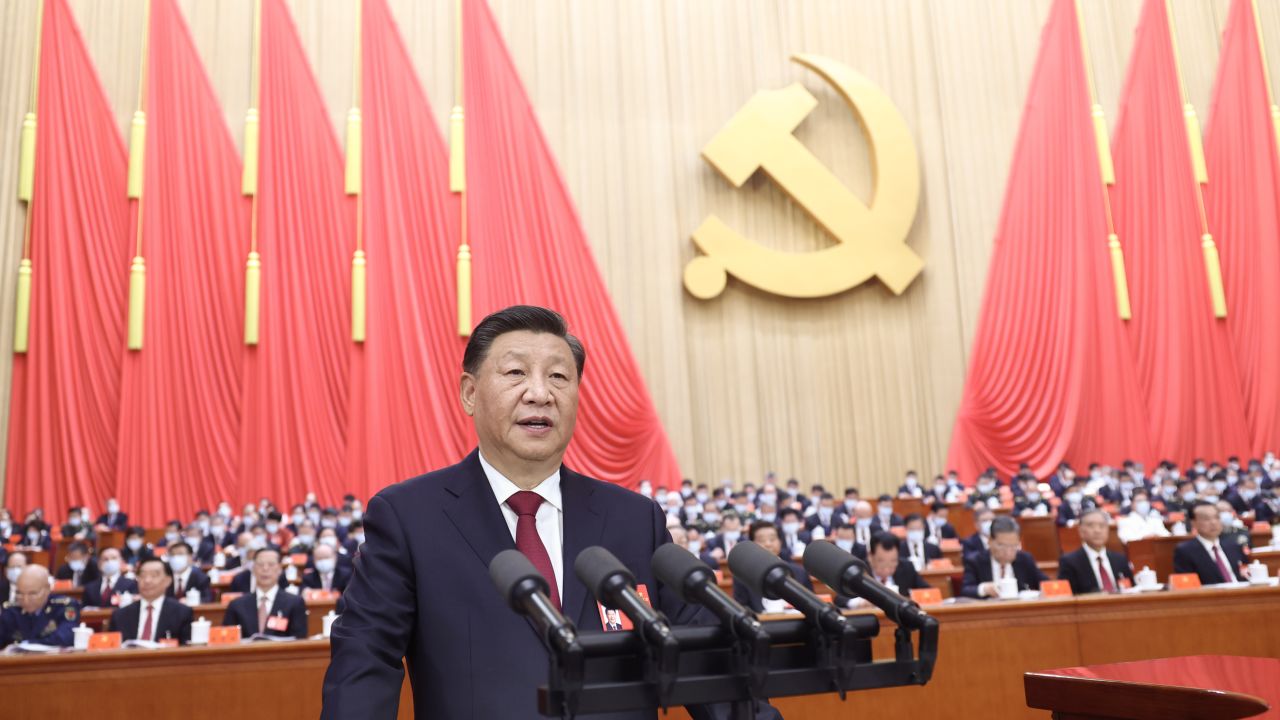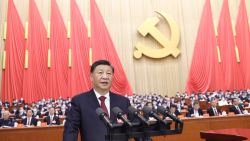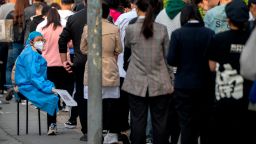Chinese leader Xi Jinping on Sunday vowed to steer China through grave challenges toward national rejuvenation, advancing a nationalistic vision that has put it on a collision path with the West.
Speaking at the opening of the 20th Party Congress, where he is poised to secure a norm-breaking third term in power, Xi struck a confident tone, highlighting China’s growing strength and rising influence under his first decade in power.
But he also repeatedly underscored the risks and challenges the country faces.
Describing the past five years as “highly unusual and extraordinary,” Xi said the ruling Communist Party has led China through “a grim and complex international situation” and “huge risks and challenges that came one after another.”
The very first challenges Xi listed were the Covid-19 pandemic, Hong Kong and Taiwan — all of which he claimed China had come away from victorious.
The Chinese government, Xi said, had “protected people’s lives and health” from Covid, turned Hong Kong from “chaos to governance,” and carried out “major struggles” against “independence forces” in the island of Taiwan, a self-governing democracy Beijing claims as its own territory despite having never controlled it.
Wen-Ti Sung, a political scientist with the Australia National University’s Taiwan Studies Program, said Xi’s decision to flag the Taiwan issue early on in his speech was a departure from previous speeches and conveys a “newfound urgency on making progress on the Taiwan issue.”
Xi won the loudest and longest applause from the nearly 2,300 handpicked delegates inside the Great Hall of the People when he spoke about Taiwan again later in the speech.
He said China would “strive for peaceful reunification” — but then gave a grim warning, saying “we will never promise to renounce the use of force and we reserve the option of taking all measures necessary.”
“The wheels of history are rolling on towards China’s reunification and the rejuvenation of the Chinese nation. Complete reunification of our country must be realized,” Xi said to thundering applause.
Xi also underscored the “rapid changes in the international situation” — a thinly veiled reference to the fraying ties between China and the West, which have been further strained by Beijing’s tacit support for Moscow following Russia’s invasion of Ukraine.
He said China has “taken a clear-cut stance against hegemonism and power politics” and “never wavered” in opposition to unilateralism and “bullying” — in an apparent jab at what Beijing views as a US-led world order that needs to be dismantled.
Laying out broad directions for the next five years, Xi said China would focus on “high quality education” and innovation to “renew growth” in the country’s crisis-hit economy. China will “speed up efforts to achieve greater self-reliance in science and technology,” he said, in comments that come just months after his damaging crackdown on the country’s private sector and major tech companies.
Xi also vowed to speed up efforts to build the People’s Liberation Army (PLA) into a “world-class military,” pledging to improve the PLA’s ability to safeguard national sovereignty and build strategic deterrence. He also urged the PLA to strengthen its training and improve its “ability to win.”
Xi’s speech was peppered with the Chinese term for “security” — which was mentioned about 50 times. He called national security the “foundation of the rejuvenation of the Chinese nation,” and urged enhancing security in military, economy and “all aspects,” both at home and abroad.
Another point of focus was Marxism and ideology. “I don’t think there will be any relaxation of the ideological atmosphere in the coming five years,” said Victor Shih, an expert on elite Chinese politics at the University of California.
Dali Yang, a political scientist at the University of Chicago, said the directions laid out in Xi’s opening speech were a continuation of his previous policies. By emphasizing the challenges and struggles, he said, it justifies “the need for a strong party and its great leader.”

Cementing power
The week-long congress kicked off on Sunday morning amid heightened security, escalated zero-Covid restrictions and a frenzy of propaganda and censorship.
The Communist Party’s most consequential meeting in decades, the congress is set to cement Xi’s status as the China’s most powerful leader since late Chairman Mao Zedong, who ruled until his death aged 82. It will also have a profound impact on the world, as Xi doubles down on an assertive foreign policy to boost China’s international clout and rewrite the US-led global order.
The meetings will be mostly held behind close doors throughout the week. When delegates reemerge at the end of the congress next Saturday, they will conduct a ceremonial vote to rubber stamp Xi’s work report and approve changes made to the party constitution — which might bestow Xi with new titles to further strengthen his power.
The delegates will also select the party’s new Central Committee, which will hold its first meeting the next day to appoint the party’s top leadership — the Politburo and its Standing Committee, following decisions already hashed out behind the scenes by party leaders before the congress.
The congress will be a major moment of political triumph for Xi, but it also comes during a period of potential crisis. Xi’s insistence on an uncompromising zero-Covid policy has fueled mounting public frustration and crippled economic growth. Meanwhile, diplomatically, his “no-limits” friendship with Russian President Vladimir Putin has further strained Beijing’s ties with the West following Moscow’s invasion of Ukraine.

Zero-Covid
In the lead-up to the congress, officials across China drastically ramped up restrictions to prevent even minor Covid outbreaks, imposing sweeping lockdowns and increasingly frequent mass Covid tests over a handful of cases. Yet infections caused by the highly transmissible Omicron variant have continued to flare. On Saturday, China reported nearly 1,200 infections, including 14 in Beijing.
Public anger toward zero-Covid came to the fore Thursday in an exceptionally rare protest against Xi in Beijing. Online photos showed two banners were unfurled on a busy overpass denouncing Xi and his policies, before being taken down by police.
“Say no to Covid test, yes to food. No to lockdown, yes to freedom. No to lies, yes to dignity. No to cultural revolution, yes to reform. No to great leader, yes to vote. Don’t be a slave, be a citizen,” one banner reads.
“Go on strike, remove dictator and national traitor Xi Jinping,” read the other.
The Chinese public have paid little attention to the party’s congresses in the past – they have no say in the country’s leadership reshuffle, or the making of major policies. But this year, many have pinned their hopes on the congress to be a turning point for China to relax its Covid policy.
A series of recent articles in the party’s mouthpiece, however, suggest that could be wishful thinking. The People’s Daily hailed zero-Covid as the “best choice” for the country, insisting it is “sustainable and must be followed.”
On Sunday, Xi defended his highly contentious and economically damaging zero-Covid policy.
“In responding to the sudden outbreak of Covid-19, we prioritized the people and their lives above all else, and tenaciously pursued dynamic zero-Covid policy in launching all-out people’s war against the virus,” he said.
Alfred Wu, an associate professor at the Lee Kuan Yew School of Public Policy at the National University of Singapore, said Xi’s words signaled it is “impossible for China to change the zero-Covid strategy in the near future.”




















